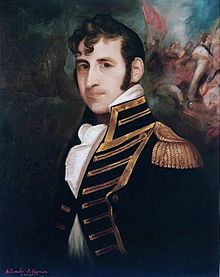Stephen Decatur junior
Stephen Decatur junior [ dɪˈkeɪtər ] (born January 5, 1779 in Berlin , Maryland , † March 22, 1820 in Bladensburg , Maryland) was an American naval officer . He was known for his work in the American-Tripolitan War (1801-1805), the British-American War in 1812 and the Second Barbarian War in 1815.
family
Decatur's father Stephen Decatur Sr. (1752-1808) was also an officer in the US Navy who participated in the American War of Independence and the Quasi-War . His mother was Ann Pine († 1812). Decatur junior married Susan Wheeler, daughter of the mayor of Norfolk , on March 8, 1806 and lived in Washington from 1818 .
Military career
In 1798 Decatur resigned as midshipman ( midshipman ) on the USS United States his service in the Navy and was already in 1799 to Lieutenant promoted.
Decatur made a rapid career. He commanded the warships Enterprise , Chesapeake , United States , President , Constitution and Guerriere .
In the American-Tripolitan War , the Algerians captured the frigate Philadelphia and brought it to the port of Tripoli . On February 16, 1804, a small contingent of American sailors, led by Lieutenant Stephen Decatur Jr., managed to penetrate the port of Tripoli and burn the Philadelphia , thus preventing their use by the enemy. As a result of this success, he was named the youngest captain of the American naval forces on the same day .
During the War of 1812 , Decatur and the United States met the British Macedonian south of the Azores on October 25 of that year . Decatur and his crew succeeded in fighting down the British ship, repairing it temporarily and entering the port of New York with him on December 4th. This success made him and his crew national heroes. He and his crew received special thanks from Congress and from President James Madison .
In 1815 Decatur was sent to the Mediterranean with a squadron of ten ships in order to put an end to the constant disruption of American shipping off the Barbarian coast. In this second barbarian war , Decatur made short work of the Dey of Algiers . He had already seized two Algerian ships, including that of the Hamidu Reis , and now, threatening to bombard the city, forced the Dey to sign a peace treaty within 48 hours. After this campaign, one of the first examples of gunboat politics , he became famous as the “conqueror of the barbarian states ”.
Between 1816 and 1820 he was a member of the Board of Navy Commissioners , an institution of the Navy that was responsible for the administration of materials. During this time, Decatur took an active part in Washington social life. At a reception Decatur made a toast that would later become famous: “Our country! In his relations with foreign countries it may always be right, but whether right or wrong; Our country! ” This toast is often quoted as “ My country, right or wrong, ” and is misrepresented as the motto of United States foreign policy .
Decatur died in a duel against the Commodore James Barron in 1820 after an argument between the two over the Chesapeake affair . Decatur died on the Bladensburg dueling grounds (now Colmar Manor ) near Washington, DC He has been buried next to his parents in St. Peter's Church in Philadelphia since 1846 .
Honors
Five ships of the US Navy were named after him: USS Decatur (1839) , USS Decatur (DD-5) , USS Decatur (DD-341) , USS Decatur (DD-936 / DDG-31) and USS Decatur (DDG- 73) . 46 American towns and parishes were named after him. It is also featured on the $ 20 Silver Certificates issued in 1886.
Web links
swell
- ↑ www.decaturhouse.org (Engl.)
- ↑ on genealogy: rootsweb.com (Engl.)
| personal data | |
|---|---|
| SURNAME | Decatur, Stephen Jr. |
| BRIEF DESCRIPTION | United States Navy officer |
| DATE OF BIRTH | January 5, 1779 |
| PLACE OF BIRTH | Berlin (Maryland) , Maryland |
| DATE OF DEATH | March 22, 1820 |
| Place of death | Bladensburg (Maryland) , Maryland |



